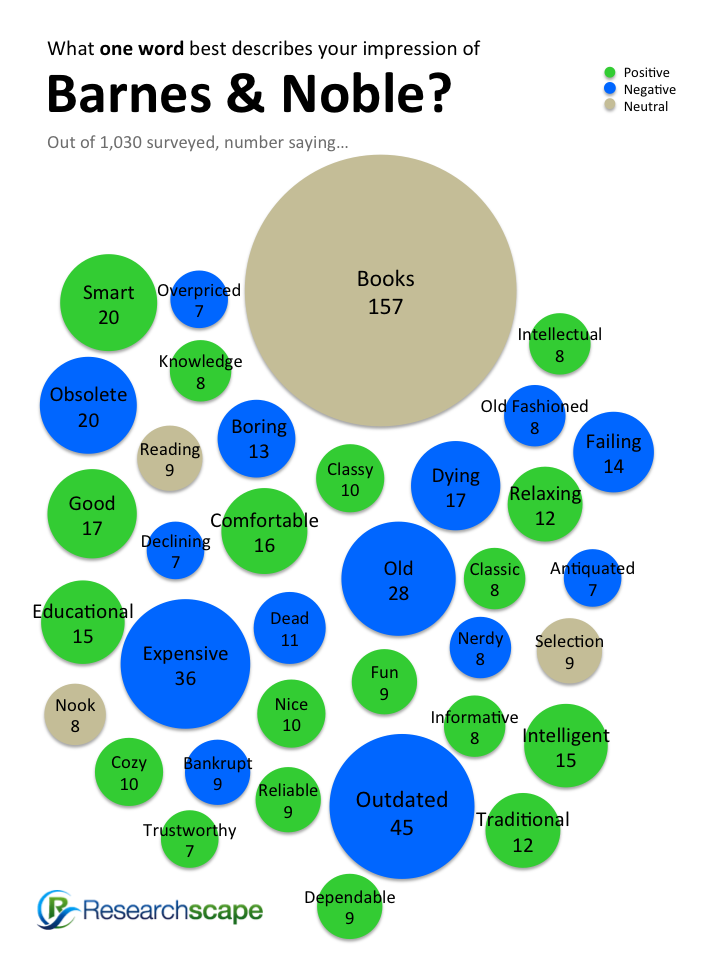Barnes & Noble in a Word: ‘Books’, ‘Outdated’, ‘Expensive’
 Americans have a mixed view of Barnes & Noble, the brick-and-mortar bookseller that is aggressively transitioning into e-books. Many view it as a relic, while others appreciate the comfort of a traditional reseller. When asked what one word comes to mind when thinking about Barnes & Noble, a plurality simply said books (157 responses).
Americans have a mixed view of Barnes & Noble, the brick-and-mortar bookseller that is aggressively transitioning into e-books. Many view it as a relic, while others appreciate the comfort of a traditional reseller. When asked what one word comes to mind when thinking about Barnes & Noble, a plurality simply said books (157 responses).
In a national survey by Researchscape, conducted September 8 to 30, 2012, with 1,030 U.S. adults, 44% of respondents used a positive term to describe Barnes & Noble, 35% used a negative term and 22% a neutral term.
Many respondents see the company being left behind: 45 used the word outdated, 28 old, 20 obsolete, 17 dying and 14 failing; other words mentioned by at least 5 respondents include dated, declining, struggling and fading. Some see the company as a relic: 8 call it old-fashioned, 7 antiquated and 4 dinosaur. Still, rumors of its demise are exaggerated; perhaps thinking of its former competitor Borders, 11 used the word dead, 9 bankrupt and 5 closed.
Barnes & Noble’s move to e-books has not made much of an impression: just 2 people mentioned e-book and only 8 mentioned the Nook, the Barnes & Noble e-reader.
Positive terms for the company relate to an aura of intelligence: 20 called Barnes & Noble smart, 15 educational, 15 intelligent, 8 intellectual, 8 informative, 8 knowledge, 5 knowledgeable and 5 literary. The physical space of the stores is seen as welcoming: 16 respondents used the word comfortable, 12 relaxing, 10 cozy, 6 calm, 6 friendly and 6 quiet.
| Count | Term | Sentiment |
|---|---|---|
| 157 | Books | 0 |
| 45 | Outdated | -1 |
| 36 | Expensive | -1 |
| 28 | Old | -1 |
| 20 | Obsolete | -1 |
| 20 | Smart | 1 |
| 17 | Dying | -1 |
| 17 | Good | 1 |
| 16 | Comfortable | 1 |
| 15 | Educational | 1 |
| 15 | Intelligent | 1 |
| 14 | Failing | -1 |
| 13 | Boring | -1 |
| 12 | Relaxing | 1 |
| 12 | Traditional | 1 |
| 11 | Dead | -1 |
| 10 | Classy | 1 |
| 10 | Cozy | 1 |
| 10 | Nice | 1 |
| 9 | Bankrupt | -1 |
| 9 | Fun | 1 |
| 9 | Reading | 0 |
| 9 | Reliable | 1 |
| 9 | Selection | 0 |
| 8 | Classic | 1 |
| 8 | Informative | 1 |
| 8 | Intellectual | 1 |
| 8 | Knowledge | 1 |
| 8 | Nerdy | -1 |
| 8 | Nook | 0 |
| 8 | Old-fashioned | -1 |
| 7 | Antiquated | -1 |
| 7 | Declining | -1 |
| 7 | Overpriced | -1 |
| 7 | Trustworthy | 1 |
Source: Researchscape, sample size = 1,030
Women are more likely than men to use positive words to describe Barnes and Noble: 50% of females used a positive term, compared to only 38% of males.
| All | Male | Female | |
|---|---|---|---|
| Positive | 44% | 38% | 50% |
| Neutral | 22% | 24% | 19% |
| Negative | 35% | 38% | 31% |
| N = | 1030 | 567 | 463 |
Source: Researchscape, sample size = 1,030
Surprisingly, there was no correlation between age and the degree of positive impression: young and old had similar views on the firm.
Out of 433 companies mentioned by respondents as the company they most admired, 1.2% of respondents chose Barnes & Noble, putting it in the Top 25. Unfortunately for Barnes & Noble, Amazon was #1, selected by 29.3% of respondents.
According to ACSI LLC, customer satisfaction with Barnes & Noble declined from 82 out of 100 in 2010 to 79 in 2011, dropping to the average for specialty retail stores, even as specialty stores in general have improved.
| 2007 | 2008 | 2009 | 2010 | 2011 | |
|---|---|---|---|---|---|
| Specialty Retail Stores | 75 | 76 | 77 | 78 | 79 |
| Barnes & Noble | 83 | 83 | 84 | 82 | 79 |
Source: ACSI LLC, Sample Size 250 per store; 3000 overall
References
ACSI. “Barnes & Noble”, 2011. Sample size 250 per company.
See also: